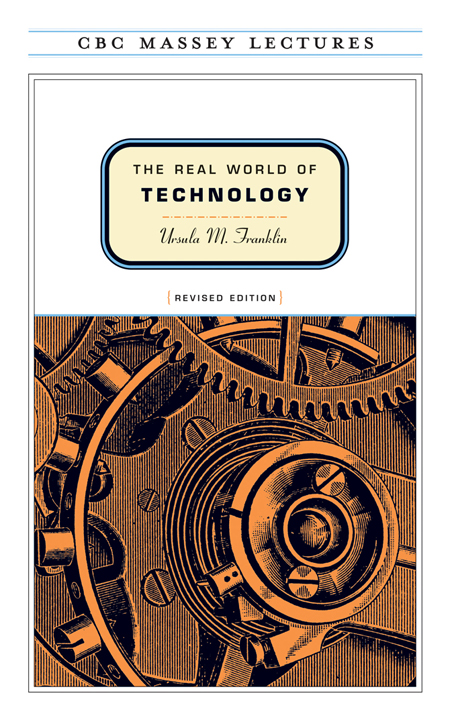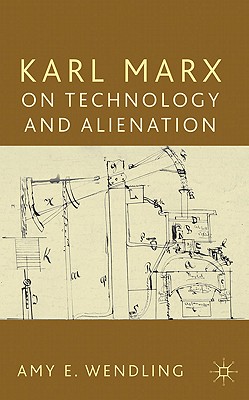Ursula Franklin: The Real World of Technology (1990–)
Filed under book | Tags: · labour, machine, society, technology, time

“In her 1989 CBC Massey Lectures, renowned scientist and humanitarian Ursula M. Franklin examines the social and political effects of technology. For her, technology is much more than machines, gadgets or electronic transmitters. It is a comprehensive system that includes methods, procedures, organization, “and most of all, a mindset”. She distinguishes between holistic technologies used by craft workers or artisans and prescriptive ones associated with a division of labour in large-scale production. Holistic technologies allow artisans to control their own work from start to finish. Prescriptive technologies organize work as a sequence of steps requiring supervision by bosses or managers. Franklin argues that the dominance of prescriptive technologies in modern society discourages critical thinking and promotes “a culture of compliance”.
The revised edition features four added chapters, in which Franklin tackles issues such as the dilution of privacy and intellectual property rights, the impact of the current technology on government and governance, the shift from consumer capitalism to investment capitalism, and the influence of the Internet upon the craft of writing.
Franklin acknowledges her intellectual debt to Jacques Ellul, Lewis Mumford, C.B. Macpherson, E. F. Schumacher and Vandana Shiva, among others.”
Publisher CBC Enterprises, Montréal, 1990
ISBN 0887943756
132 pages
Revised edition
Publisher House of Anansi Press, Toronto, 1999
ISBN 088784636X, 9780887846366
xii+209 pages
via seasounds, in the Unlimited Edition
Publisher (1999)
WorldCat (1999)
PDF (1990, 4 MB, added on 2021-2-27)
EPUB (rev.ed., 1999)
Audio recording
Matthew Wisnioski: Engineers for Change: Competing Visions of Technology in 1960s America (2012)
Filed under book | Tags: · 1960s, 1970s, activism, computing, education, engineering, history of computing, history of technology, labour, luddism, military, science, space, technology

“In the late 1960s an eclectic group of engineers joined the antiwar and civil rights activists of the time in agitating for change. The engineers were fighting to remake their profession, challenging their fellow engineers to embrace a more humane vision of technology. In Engineers for Change, Matthew Wisnioski offers an account of this conflict within engineering, linking it to deep-seated assumptions about technology and American life.
The postwar period in America saw a near-utopian belief in technology’s beneficence. Beginning in the mid-1960s, however, society—influenced by the antitechnology writings of such thinkers as Jacques Ellul and Lewis Mumford—began to view technology in a more negative light. Engineers themselves were seen as conformist organization men propping up the military-industrial complex. A dissident minority of engineers offered critiques of their profession that appropriated concepts from technology’s critics. These dissidents were criticized in turn by conservatives who regarded them as countercultural Luddites. And yet, as Wisnioski shows, the radical minority spurred the professional elite to promote a new understanding of technology as a rapidly accelerating force that our institutions are ill-equipped to handle. The negative consequences of technology spring from its very nature—and not from engineering’s failures. “Sociotechnologists” were recruited to help society adjust to its technology. Wisnioski argues that in responding to the challenges posed by critics within their profession, engineers in the 1960s helped shape our dominant contemporary understanding of technological change as the driver of history.”
Publisher MIT Press, 2012
ISBN 0262018268, 9780262018265
296 pages
via a2
Interview with the author (Carla Nappi, New Books in Science, Technology, and Society, audio, 1h)
Review (Caroll Pursell, The American Historical Review, 2014)
Review (Kevin T. Baker, The Sixties, 2013)
Review (Stephen H. Unger, 2013)
Amy E. Wendling: Karl Marx on Technology and Alienation (2009)
Filed under book | Tags: · alienation, capitalism, communism, labour, machine, philosophy, philosophy of technology, revolution, technology, thermodynamics, value, women, work

“In Karl Marx on Technology and Alienation, Amy Wendling draws on lesser known archival materials, including Marx’s notebooks on women and patriarchy and technology to offer a new interpretation of Marx’s concept of alienation as it develops throughout his works. For Marx, technology exemplifies the interaction between human beings and nature. Marx’s description of this interaction is in transition throughout his works. An older, humanist and vitalist paradigm sets the human being against nature as a qualitatively different type of force. A newer, thermodynamic paradigm sets the human being and nature in continuity. Marx’s work occurs at the juncture of these paradigms and contains elements of each. This affects his deployment of the concept ‘labor’. Labor is demoted from its status as a meaningful human activity that confers political status and mastery of the natural world, and it becomes a mere nodal point where energy is transferred. Against this backdrop, Marx increasingly appealed not to meaningful labor but to the abolition of labor as the culmination of human freedom. He also shows how the labours of members of the working class, including women, are interpreted in the old and new paradigms.”
Publisher Palgrave Macmillan, 2009
ISBN 0230224407, 9780230224407
272 pages
Reviews: Chris Arthur (Marx & Philosophy Review of Books, 2010), Richard Cotter (LSE Review of Books, 2013), Tom Bunyard (Historical Materialism, 2014), McKenzie Wark (Public Seminar, 2015).
Comment (0)
